- Clone
- CB9 (See other available formats)
- Regulatory Status
- RUO
- Other Names
- Granzyme 1, Hanukah factor serine protease (HFSP), Cytotoxic T-lymphocyte-associated serine esterase 3 (CTLA-3)
- Isotype
- Mouse IgG1, κ
- Ave. Rating
- Submit a Review
- Product Citations
- publications
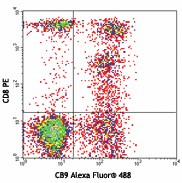
-

Human peripheral blood lymphocytes surface stained with CD8 PE, then intracellularly stained with CB9 Alexa Fluor® 488
| Cat # | Size | Price | Quantity Check Availability | Save | ||
|---|---|---|---|---|---|---|
| 507212 | 100 tests | £182 | ||||
Granzyme A is a 28 kD disulfide-linked homodimeric protein and the most abundant of the proteases occurring in CTL granules. It is homologous to other serine esterases, including other granyzmes, mast cell proteases, and neutrophil cathepsins. Granzyme B is thought to be a rapidly-acting apoptotic enzyme, while Granzyme A is slow acting. The CB9 monoclonal antibody recognizes human Granzyme A and has been shown to be useful for flow cytometry, immunoprecipitation, and immunohistochemistry (paraffin-embedded sections).
Product DetailsProduct Details
- Verified Reactivity
- Human
- Antibody Type
- Monoclonal
- Host Species
- Mouse
- Immunogen
- Purified human Granzyme A
- Formulation
- Phosphate-buffered solution, pH 7.2, containing 0.09% sodium azide and BSA (origin USA)
- Preparation
- The antibody was purified by affinity chromatography and conjugated with Alexa Fluor® 488 under optimal conditions.
- Concentration
- Lot-specific (to obtain lot-specific concentration, please enter the lot number in our Concentration and Expiration Lookup or Certificate of Analysis online tools.)
- Storage & Handling
- The antibody solution should be stored undiluted between 2°C and 8°C, and protected from prolonged exposure to light. Do not freeze.
- Application
-
ICFC - Quality tested
- Recommended Usage
-
Each lot of this antibody is quality control tested by intracellular immunofluorescent staining with flow cytometric analysis. For flow cytometric staining, the suggested use of this reagent is 5 µl per million cells in 100 µl staining volume or 5 µl per 100 µl of whole blood.
* Alexa Fluor® 488 has a maximum emission of 519 nm when it is excited at 488 nm.
Alexa Fluor® and Pacific Blue™ are trademarks of Life Technologies Corporation.
View full statement regarding label licenses - Excitation Laser
-
Blue Laser (488 nm)
- Application Notes
-
Additional reported applications (for the relevant formats) include: immunohistochemical staining3 of formalin-fixed paraffin-embedded tissue sections, and immunoprecipitation2.
-
Application References
(PubMed link indicates BioLegend citation) -
- Trimble L, et al. 1998. Blood 91:585.
- Beresford P, et al. 1997. P. Natl. Acad. Sci. USA 94:9285.
- Raqib R, et al. 2002. Infect. Immun. 70:3199.
- Chen H, et al. 2005. J. Immunol. 175:591.
- Product Citations
-
- RRID
-
AB_528909 (BioLegend Cat. No. 507212)
Antigen Details
- Structure
- Serine protease; disulfide-linked homodimer; 28 kD (Mammalian)
- Ligand/Receptor
- Assisted by perforin
- Bioactivity
- Induction of caspase-independent cell death by apoptosis; release of NM23-H1 for single-strand DNA nicking
- Cell Sources
- Cytotoxic T cells, NK cells
- Cell Targets
- Intracellular targets lamins A, B cells, C, nucleosome assembly protein (NAP) SET cells, HMG2, Ape1/Ref-1, histones; cleaves SET:NM23-H1 complex to release NM23-H1
- Receptors
- Assisted by perforin
- Cell Type
- Tregs
- Biology Area
- Cell Biology, Immunology, Innate Immunity, Neuroscience
- Molecular Family
- Proteases, Enzymes and Regulators
- Antigen References
-
1. Brune J, et al. 1986. Nature 322:268.
2. Fan Z, et al. 2003. Nature Immunol. 4:145.
3. Fan Z, et al. 2003. Cell 112:659.
4. Masson D, et al. 1987. Cell 49:679. - Gene ID
- 3001 View all products for this Gene ID
- UniProt
- View information about Granzyme A on UniProt.org
Related FAQs
Other Formats
View All Granzyme A Reagents Request Custom Conjugation| Description | Clone | Applications |
|---|---|---|
| FITC anti-human Granzyme A | CB9 | ICFC |
| PE anti-human Granzyme A | CB9 | ICFC |
| Purified anti-human Granzyme A | CB9 | ICFC,ICC,IP,IHC-P |
| Pacific Blue™ anti-human Granzyme A | CB9 | ICFC |
| Alexa Fluor® 700 anti-human Granzyme A | CB9 | ICFC |
| Alexa Fluor® 488 anti-human Granzyme A | CB9 | ICFC |
| Alexa Fluor® 647 anti-human Granzyme A | CB9 | ICFC |
| PerCP/Cyanine5.5 anti-human Granzyme A | CB9 | ICFC |
| Alexa Fluor® 594 anti-human Granzyme A | CB9 | ICFC,ICC |
| APC anti-human Granzyme A | CB9 | ICFC |
| PE/Cyanine7 anti-human Granzyme A | CB9 | ICFC |
| TotalSeq™-B1099 anti-human Granzyme A | CB9 | ICPG |
| PE anti-human Granzyme A | CB9 | ICFC |
Customers Also Purchased
Compare Data Across All Formats
This data display is provided for general comparisons between formats.
Your actual data may vary due to variations in samples, target cells, instruments and their settings, staining conditions, and other factors.
If you need assistance with selecting the best format contact our expert technical support team.
-
FITC anti-human Granzyme A
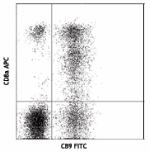
Human peripheral blood lymphocytes surface stained with CD8a... -
PE anti-human Granzyme A
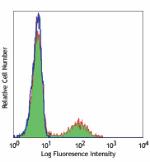
Human peripheral blood lymphocytes intracellular stained wit... -
Purified anti-human Granzyme A
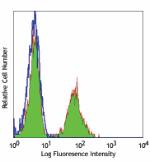
Human peripheral blood lymphocytes intracellular stained wit... -
Pacific Blue™ anti-human Granzyme A
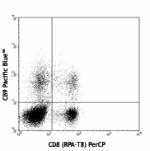
Human peripheral blood lymphocytes intracellularly stained w... -
Alexa Fluor® 700 anti-human Granzyme A
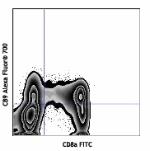
Human peripheral blood lymphocytes surface stained with CD8 ... -
Alexa Fluor® 488 anti-human Granzyme A
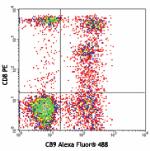
Human peripheral blood lymphocytes surface stained with CD8 ... -
Alexa Fluor® 647 anti-human Granzyme A
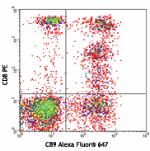
Human peripheral blood lymphocytes surface stained with CD8 ... -
PerCP/Cyanine5.5 anti-human Granzyme A

Human peripheral blood lymphocytes were surface stained with... -
Alexa Fluor® 594 anti-human Granzyme A
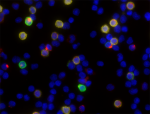
Human PBMCs were fixed with 2% PFA for 10 min, permeabilized... 
Human peripheral blood mononuclear cells were stained with C... -
APC anti-human Granzyme A
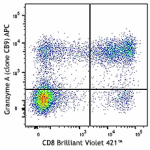
Human peripheral blood lymphocytes were surface stained wit... 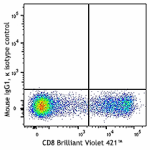
-
PE/Cyanine7 anti-human Granzyme A

Human peripheral blood lymphocytes were surface stained with... -
TotalSeq™-B1099 anti-human Granzyme A
-
PE anti-human Granzyme A

Typical results from human peripheral blood lymphocytes fixe...

 Login / Register
Login / Register 











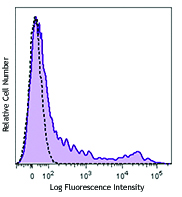
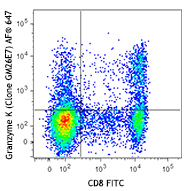
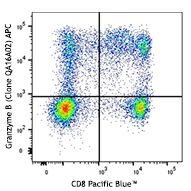
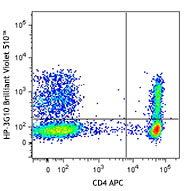



Follow Us